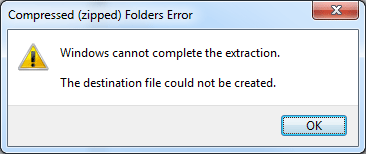Cannot Create Extraction Directory
7z x d:migrationmongomongodb.7z o:f:data.rI'm using this command as part of a batch to extract the contents of a 7z file from one drive (D) to another (F). The folder structure is important so I'm using the x command with recursion.What's supposed to happen is the archive contents are decompressed into f:data.What's actually happening is the contents are being decompressed into the batch file's directory working directory ( f:migration). Specifying working directory ( -w:) in the command has no effect.How can I make my command work as intended?I'm using 7zip x64 9.22b on Windows Server 2012 R2.Edit: my original question noted that data was being extracted to two simultaneous places. As it turns out this was not the case. My question was updated to reflect this.


In one of our several articles about the, we showed you how to in Linux. This short guide explains you how to extract/unzip.zip archive files to specific or different directory in Linux.Zip is a simple, cross-platform file packaging and compression utility for Unix-like systems including Linux and Windows OS; plus many other operating systems.
Checkdir Cannot Create Extraction Directory
The “ zip” format is a common archiving file format used on Windows PC’s and most importantly, it enables you to specify the compression level between 1 and 9 as an option.Read Also: Create Zip Archive File in LinuxTo create a.zip (packaged and compressed) file from the command line, you can run a similar command as the one below, The -r flag enables recursive reading of files directory structure. $ zip -r tecmintfiles.zip tecmintfiles. Create Zip File in LinuxTo unzip the tecmintfiles.zip archive file you have just created above, you can run the unzip command as follows. $ unzip tecmintfiles.zipThe above command will extract the files into the current working directory. What if you want to send the unziped files into a specific or different directory – you can learn this in next section. Extract Zip File to Specific or Different DirectoryTo extract/unzip.zip archive files to specific or different directory from the command line, include the -d unzip command flag as shown below.

We will use the same example above to demonstrate this.This will extract the.zip file content into the /tmp directory: $ mkdir -p /tmp/unziped$ unzip tecmintfiles.zip -d /tmp/unziped$ ls -l /tmp/unziped/.






